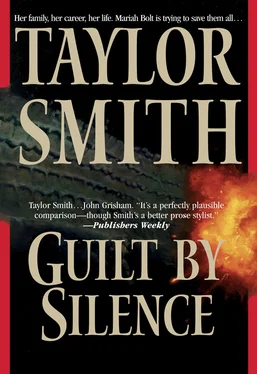“He and George Neville have been working on a file,” Pat said. Neville was the CIA deputy director for operations—DDO. “I’m not cleared for it, though. I thought you were.”
“Why did you think that?”
“Because Neville was in Frank’s office the other day. Frank asked me to bring them coffee and when I opened the door, I heard Neville mention your name.”
“What was he saying?”
Pat shook her head. “He clammed up when I walked in. What’s this about, Mariah?”
“That’s what I’d like to know. I think it’s got something to do with the accident in Vienna.”
“What do you mean?”
“Apparently, it was no accident.”
“What?”
Mariah sighed and settled down on the edge of her desk. “Look, Patty, I don’t know what’s going on, but I shouldn’t be saying anything. You know Frank—he’d throw a fit if he knew I’d told you this much, so do me a favor and don’t mention it, okay?”
“I won’t say anything. But what do you plan to do?”
Mariah turned back to the window. “I don’t know. But I have to find out what really happened.”
With Frank or without him, she thought.
When Pat left her office, Mariah stood at the window a few minutes longer, struggling against the pain and black fury that were threatening to short-circuit her brain. Forcing herself to turn away from the window, she caught sight of the computer terminal next to her desk. She sat down and flicked it on, her mind racing as the monitor raised its greenish glow.
After a short delay, the screen prompted her to enter her password, the first line of defense against unauthorized access to the Agency’s data banks. All employees had a personal access code, known only to themselves and the computer. Security procedures required that the password be changed every month.
Mariah punched in her current personal code— “SIGMUND,” the name of her neighbor’s cat. After the mess she had found in her tiny garden, the feline had been on her mind the last time she had changed her password. The cursor moved across the screen as she entered the cat’s name, but only Xs appeared—another security measure.
After a brief delay, the monitor flashed a message: “PASSWORD VALID. FILE SEARCH MODE. ENTER FILE NAME.”
She returned her gaze to the keyboard and punched in “CHAUCER.”
There was another short delay. Her stomach flipped when she saw the reply: “RESTRICTED FILE. ACCESS DENIED. ENTER NEW FILE NAME.”
“Access denied, my foot!” she muttered. “That’s my file.”
She punched in her password again: “CHAUCER.”
“RESTRICTED FILE. ACCESS DENIED. ENTER NEW FILE NAME.”
Her heart was pounding as she leaned back in her chair and stared at the stubborn message. Then she hunched forward again. “All right,” she said under her breath, “let’s try another approach.”
She punched in a new file request: “MARIAH BOLT. PERSONAL LOG. VIENNA STATION.”
The cursor flashed for a moment as the Cray computer down in the Agency’s basement searched its data banks. Then a long list of document titles began scrolling down the screen—three years’ worth of contact reports and intelligence assessments that she had filed while she was posted to the CIA station in Vienna. As her eye scanned the rolling list, Mariah’s mind wandered back.
It was never a given that she would get an overseas assignment.
Despite its monolithic appearance, the CIA is a bureaucracy like any other, with internal divisions and rivalries. The most pronounced is between its operations (DDO) and analysis (DDI) directorates. Operations officers do the overseas clandestine work, while back at Langley, analysts sift through masses of intelligence garnered from various sources like tea-leaf readers, trying to predict the future. These two sides of the house view each other with mutual suspicion bordering on contempt. The trained covert operators regard the analysts as ineffectual pencil pushers, shuffling papers and conducting endless intellectual debates while the world burns around them. To the analysts, the clandestine ops people are cowboys, too often launching risky and ill-conceived operations that end up backfiring and smearing the Agency’s reputation. Limited interplay between these two directorates only feeds the skepticism and distrust between them.
Mariah had made her career among the analysts. Frank had recruited her because of her specialized knowledge of the Soviet arsenal, and for ten years she had helped track political and military developments in the Soviet Union. She had worked on various desks, sifting through intercepted communications for hints of what the Soviets were planning next, poring over the satellite photographs of secret installations, interpreting whatever gossip could be gleaned on who was up and who was out in the Moscow hierarchy. On a couple of occasions, under State Department cover, she had attended Soviet-American conferences posing as an administrative aide, meeting the faces behind the names in the intelligence reports and trying to figure out if there were moderates on the other side who would work for an end to the craziness.
During this time, David had been building a name for himself as a brilliant theoretician as well as a thoughtful writer on the need to contain the atomic beast that the scientists at Los Alamos had unleashed in 1945. When the Soviet Union had first begun to show signs of disintegration, he and Mariah had both worried about the danger of its nuclear arsenal slipping away in the confusion. David had developed a friendship with Hans Blix, the Swedish director general of the International Atomic Energy Agency, the U.N.’s nuclear watchdog. When Blix asked David to come to Vienna to help with the job of beefing up the IAEA, he was eager to accept.
Mariah had talked it over with Frank and he, in turn, had gone to DDO, George Neville. In the end, they had agreed to transfer Mariah to the operations side of the Agency and post her to the Vienna station under cover of the embassy’s administrative section. For the period of the Vienna assignment, Mariah—somewhat to her chagrin—had joined the cowboys.
The list of titles on the screen ended with a reference to the last contact report she had filed in Vienna. It was a brief account of her secret meeting with the Hungarian diplomat she had raced off to see instead of driving Lindsay to school that terrible morning.
She fumed at the sight of his code name on the screen— “RELIANCE”—someone’s idea of a joke, it seemed. The man was an alcoholic and a completely unreliable asset. He had been run by the Company for years, far beyond his capacity to provide anything useful by way of information on the crumbling Soviet empire in Eastern Europe. For this bum, I sent my family into a trap, Mariah thought bitterly.
But what she was looking for as she scanned the names of reports was “CHAUCER”—the code name of the Russian physicist who had confided her suspicion that Soviet nuclear weapons were being traded for hard currency. Mariah had met her through David’s office, had recruited her, had been her handler right up to the day the woman disappeared.
Tatyana Baranova was serving in the multinational IAEA when Mariah first encountered her at an agency farewell party for a departing British inspector. Lindsay was there, too, Mariah suddenly remembered with a smile. In fact, truth be told, it was Lindsay who had opened the door to the CHAUCER operation.
She had picked Lindsay up from the American School, and the two of them had run up to David’s IAEA office in the Vienna International Centre on the Wagramerstrasse. There they had found an office party in full swing.
Someone had placed a glass of wine in Mariah’s hand and a soft drink in Lindsay’s, and the two of them were sitting perched on a desk in a corner, laughing at David playing his harmonica and the impromptu chorus serenading the retiring British inspector with an off-key and tragicomic rendition of the Beatles’ “Yesterday.” When the song ended, half of the chorus was on bended knee, arms wrapped around the legs of the laughing Brit, imploring him to stay. Lindsay giggled at the silliness as the inspector turned several shades of red, struggling in vain to detach himself from the grip of the clowns at his feet.
Читать дальше












